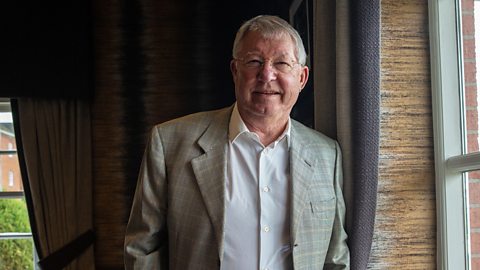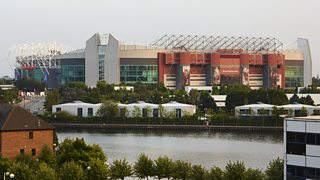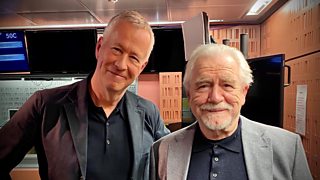10 things we learned from Sir Alex Ferguson: Made in Govan

Sir Alex Ferguson won 38 major trophies with Manchester United, and 10 with Aberdeen. He claimed European silverware with both clubs, plus numerous league titles and domestic cups.
How did a man from a tenement in deprived Govan, who had to borrow boots from a family relation to play football, make it to be the very best?
In Radio 4’s Sir Alex Ferguson: Made in Govan, Βι¶ΉΤΌΕΔ Radio Manchester presenter Mike Sweeney has the rare honour of interviewing Sir Alex about his incredible life. Here’s what we learned…
Portraits by Tricia Yourkevich © Βι¶ΉΤΌΕΔ
1. Sir Alex never thought of his family as poor
Life was tough for Sir Alex growing up. “I always remember finding a wage packet of my dad's when I was about 15,” says Sir Alex. “It was for £7.50. He’d worked 70-odd hours.” His dad worked at the Fairfield shipyard in Govan, and the family lived in a tenement block. Sir Alex considered the family lucky to have an inside toilet – some families had to share a communal one with “newspaper on a nail” serving as toilet paper. They had no bath or shower; instead, the Ferguson family used a tin bath stored under the bed. Despite this, Sir Alex never considered himself as poor: “It’s not as if there were people getting about in Rolls Royces or anything like that.”

2. He queued to get a game of football
One of the best things about the tenement where Sir Alex lived was the courtyard – with its wooden posts where washing was hung up, it was a great space for football. “We used to have a summer tournament, one against one,” recalls Sir Alex. “Everybody used to watch. I got to one final in all my time there and I lost it!” Another great space was “the works”, the site of a building that had been bombed in the war. “You had to queue up on Sunday to get a game there,” says Sir Alex.
3. He learned a life lesson playing rounders
One of Sir Alex’s role models was a Mrs Thompson at his school. “She was a Rottweiler,” he says. Up to bat in a game of rounders, Sir Alex recalls knocking the ball to one side just to get to first base. “If you ever do that again. I’ll have your blood,” Mrs Thompson said. “The next time I battered it!” remembers Sir Alex. Mrs Thompson was one of the first people Sir Alex talked to about wanting to be a footballer; they were in touch again when he became a player, and from then on until she passed away.

4. He was a toolmaker and a Union official
Playing for several young amateur teams by the age of 14, initially with boots borrowed from a relative, it wasn’t long before Sir Alex had to balance his goal-scoring with working life. After leaving school, he became an apprentice with typewriter manufacturer Remington Rand. When he was 18, in 1960, he became the shop steward and found himself leading his 10 young colleagues to join a general apprentice strike over pay. His activism was not a surprise. His parents were staunch socialists, and as Sir Alex remarks: “That environment instils in you the same beliefs.”
5. Sir Alex nearly went to live in Canada
There was an inevitable tension between Sir Alex’s apprenticeship and his burgeoning football career. Around the time he became shop steward Sir Alex signed as a professional with St Johnstone in Perth. “It was a big mistake,” he recalls. Training with the club involved a nightmare commute and the union effectively vetoed the arrangement after contacting the footballing authorities. Sir Alex had to train where he could, and so he felt side-lined. “I started to go out on a Friday night, and I really lost the desire.”
A falling out with his dad at home made matters worse. Sir Alex decided the solution was to do what a number of British people were doing at the time – emigrate to Canada.
6. He was the first player to score a hat-trick against Rangers at Ibrox
A call-up to play for St Johnstone against Rangers, Sir Alex’s childhood team, turned Sir Alex’s Canada plan on its head.
“I went into the bath after the game,” remembers Sir Alex, “I wasn’t thinking much about it to be honest. Then I remember Jim Little, the centre-half said, ‘You made history – you’re the first person to score a hat-trick against Rangers at Ibrox!’”
It was a match that Sir Alex has described as “the most important game in my life” and it helped him mend the rift with his dad. Four years later, Ferguson was playing for Rangers.

Nobody had ever scored a hat-trick against Rangers at Ibrox...
Sir Alex Ferguson describes the moment when everything in his footballing career changed.
7. He was one of the first of his generation to train as a coach
Though things didn’t ultimately work out at Rangers, Sir Alex says: “What I took out of there was an expectation… an understanding of what a great club should be. This is exactly what I knew I had to do if I wanted to be a manager.”

Having already decided that he would never go back to engineering, Ferguson started to prepare for management by training for his coaching badges, an unusual thing for a player to do at the time, especially one in their early twenties.
8. He ran pubs
Sir Alex went through various eventful incarnations in his early managerial career. He was a player coach at Falkirk, then he had a brief period playing part-time for Ayr United, during which time he also ran a couple of pubs. He encountered numerous interesting characters including one regular who sold him a jacket that fell apart the first time he wore it! “Cathy [his wife] was killing herself laughing, but I was saying ‘I’ll kill that guy!’”, he recalls. Scotland manager Ally MacLeod helped Sir Alex to make his next move – managing East Stirling. The team only had eight players until he bought five more!
9. He had some invaluable advice from Jock Stein
When Sir Alex was offered a job at the Paisley club, St Mirren, he asked legendary Celtic and Scotland manager Jock Stein for advice. He told Jock that he felt he would be letting East Stirling down. “Jock said ‘really? Well, the only advice I can give you, son, is go and sit in the stand at St Mirren and then sit in the stands at East Stirling, and there's your answer’, and then he put the phone down.”
When you get an opportunity, don't be afraid of it. Do it.Sir Alex Ferguson
“It's a scale of progress,” remarks Sir Alex. “When I made the move to St Mirren, I knew then it was a starting point. And when I was at Aberdeen, I knew it would come to a point that had to be challenged. When Manchester United offered me a job – I turned down Wolves, Arsenal, Tottenham. I couldn't turn Man United down; you could never turn Man United down.”
10. He believes in a working-class ethic
Sir Alex is known for asking players what their parents or grandparents did as a way of connecting them to their working-class roots. “I think to develop a working-class ethic about yourself is very important. My mother used to say: ‘Don’t steal’; my dad always said: ‘Don’t be late, always be early’.” While he recognises that values have changed, one piece of enduring advice Sir Alex would give to working-class kids is: “When you get an opportunity, don't be afraid of it. Do it.”
-
![]()
Listen to Sir Alex Ferguson: Made in Govan
From tenements to toolmaking to tournaments, Sir Alex Ferguson joins Βι¶ΉΤΌΕΔ Radio Manchester presenter Mike Sweeney to reflect on how his early life shaped his extraordinary career.

More deep conversations on Radio 4
-
![]()
Desert Island Discs: Peter Schmeichel
Peter Schmeichel, footballer, shares the eight discs, book and luxury item he would want with him if cast away on a desert island.
-
![]()
Desert Island Discs: Arsène Wenger
Arsène Wenger, the manager of Arsenal FC for 22 years, shares his eight discs, book and luxury with Lauren Laverne.
-
![]()
This Cultural Life: Brian Cox
Actor Brian Cox talks to John Wilson about the experiences and influences that have shaped his stage and screen career.
-
![]()
The Archbishop Interviews... Tony Blair
The former PM's faith was foundational to the values and principles that underpinned a remarkable political career.




